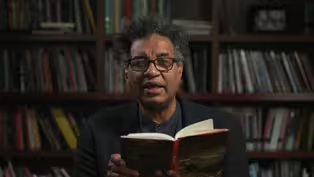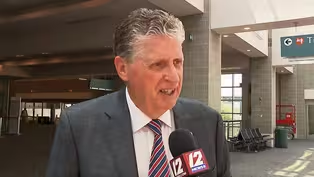
Art of Love
Clip: Season 5 Episode 31 | 9m 56sVideo has Closed Captions
The power of Art and Love when caring for someone with Alzheimer’s.
Nearly 7 million Americans suffer from Alzheimer’s disease. Producer Dorothy Dickie has an in-depth report on how the power of art and love helped Massachusetts’s artist Sara Holbrook as her husband’s Alzheimer’s got progressively worse with each passing day.
Problems playing video? | Closed Captioning Feedback
Problems playing video? | Closed Captioning Feedback
Rhode Island PBS Weekly is a local public television program presented by Ocean State Media

Art of Love
Clip: Season 5 Episode 31 | 9m 56sVideo has Closed Captions
Nearly 7 million Americans suffer from Alzheimer’s disease. Producer Dorothy Dickie has an in-depth report on how the power of art and love helped Massachusetts’s artist Sara Holbrook as her husband’s Alzheimer’s got progressively worse with each passing day.
Problems playing video? | Closed Captioning Feedback
How to Watch Rhode Island PBS Weekly
Rhode Island PBS Weekly is available to stream on pbs.org and the free PBS App, available on iPhone, Apple TV, Android TV, Android smartphones, Amazon Fire TV, Amazon Fire Tablet, Roku, Samsung Smart TV, and Vizio.
Providing Support for PBS.org
Learn Moreabout PBS online sponsorshipYou know, I'm visual, and everything sort of matters to me visually more than anything, even jokes.
If a joke is a visual joke, I get it more than I get a spoken joke.
It's important for me to express myself through art.
My name is Sara Holbrook, and I'm an artist.
My husband, Foster Aborn, he was kind, he was generous, he was warm and caring, and helped so many people with their careers.
He was the love of my life.
Probably about 12 years ago, he drove home in a snowstorm, and he forgot where he was going.
By the time he got home, he was flustered, and he called his doctor the next day and said that this was not usual.
He was worried about his memory.
And at that time he had mild cognitive impairment.
They said not to worry, and he was still fine for a long time after that.
I specialized in watercolor, but I took a photography course with a friend out of curiosity in Boston, and I fell in love with photography.
And then it was crucial when my husband was ill because I didn't have time to paint.
You know, that takes a lot of time and concentration.
If he took a nap or something, I could do the my art in stages, which is important.
I started out with dreams.
I would dream up these ideas, and then I would take a background photo.
I would take a photograph of myself.
I had to be dressed as I needed to be for the photograph, and I had to be in the right position.
And that was always a little difficult to figure out how to do that.
But that worked.
And then I put it on the computer and scaled it down, and then printed it out and I cut it out, and I pasted it onto the background photo, and then I rephotographed it.
That was my process.
(gentle music) Later, I entitled my work "99 Problems," because that also reflects what I was dealing with as a caregiver for somebody with Alzheimer's.
I found the photograph when I was in Paris, and I just was drawn to it for the visual image of it.
It was orange and it was a perfume bottle.
And I snapped the photo and didn't think much of it until I started dealing with this Dream series.
And I put myself in it as a scuba diver.
Somebody was trapped and couldn't get out.
And that's the situation as a spouse, there you are, then you're dealing with this and that's what you do, but you're stuck.
"99 Problems" was a perfect metaphor because you never knew what problem was going to present itself.
There were myriad things that would happen to you during the course of a day, just unexpected.
And I had to feel like Wonder Woman, because I was dealing with so much, you know?
He liked to work more than anything.
So he'd go to his office.
So that worked out until Covid hit.
And then he couldn't go in anymore.
And that was very frustrating for him, because he didn't understand at that point anything about Covid.
He couldn't understand that all of Boston was really shut down.
He couldn't go into his office building, and he'd wander from the house trying to go to Boston.
He'd walk, you know?
And I'd have to run after him at all hours of the day and night.
I tried to keep him in, but it was sort of a full-time job just keeping the reins on him.
Well, the hardest part for me was not getting any sleep.
I was always, always on alert, on call, because he would wake up in the middle of the night and leave the house.
So I had to be ready to try to persuade him to come back.
Or I'd have to follow him outside and walk around in the middle of winter or in a rainstorm, anything.
And call the police sometimes.
If I couldn't persuade him to come back, I had to.
The police knew him pretty well.
How I dealt with it on the worst days was by loving him, knowing that I loved him, and that he was a worthy human being even if I was frustrated.
I tried to use humor as a way to diffuse the frustration.
So I think you look at it and you see both.
You don't know whether to laugh or cry when you look at my work, but you get it.
This is called "Rinse Cycle."
It was a very, very bad day.
It just shows intense frustration.
He saw the work, but it didn't register with him.
He even went to an art opening that I had, and he was just happy to be there with the people, but he had no idea of the concept of it.
So we both love Paris, and that was my place for shooting with my camera, because I just felt so alive there.
In October, 2019, I was walking around Paris with Foster.
I had been taking photographs, and we were heading back to the hotel.
And I saw some people gathering.
They were carrying these life-sized cutouts of people, and I was just fascinated.
I wanted to take a photograph and it wasn't long at all, but I turned around and Foster was gone.
And after an hour of looking, I came back to the hotel and Foster was there with this lovely young man.
And the man said that he, in fact, was a researcher in Alzheimer's.
And Foster found him in the whole city of Paris and went up to him and asked for help.
Amazing.
Absolutely amazing.
I didn't know I could cope with this.
And looking back, I don't know how I did.
I kept him far longer than anybody said that I should have, you know, at home because I loved him.
And putting him somewhere just didn't seem right, but eventually I had to do it.
We were really close to one another, you know?
And even when he was in memory care, we had fun.
I miss that.
You know, you sort of settle at whatever level they are at, and he still reacted.
I danced with him when I'd go in, you know.
It's still very intimate.
My understanding of Alzheimer's is, it's really a different process for everybody.
But it is usually very frustrating for the caregiver.
It's just your favorite person has become somebody else, basically.
And that's very hard to digest.
If you're an artist, you are driven to do something artistic.
It gave me an outlet.
It gave me a way to express how frustrated I was.
And somehow that relieved the frustration, and art's terrific that way.
And what amazes me is that my art has helped other people in this same situation, even though they didn't do the art.
For me, It was a joy to do the art.
but people looking at it, I think feel that it gives them license to feel their frustration, to own that frustration as well.
I think it just shows that it's okay to be frustrated and express yourself that way, because I hope my art shows the love that I have for my husband, but also shows that it's a very frustrating thing to take care of someone with Alzheimer's.
It's the hardest thing I've ever had to deal with in my life.
It was a long journey to be with somebody with Alzheimer's, because this is really a strange one.
You know, when people's minds go, it's difficult.
I've just been coping, you know, I don't know how I'm doing, it's just gonna take time.
I'm not sure how I'm gonna deal with it.
I will deal with it at some point, and be on another project.
(uplifting music) - Finally tonight, on this episode of "Weekly Insight,"
Video has Closed Captions
Clip: S5 Ep31 | 8m 55s | Colin Channer finds a connection between his homeland and the Ocean State. (8m 55s)
Video has Closed Captions
Clip: S5 Ep31 | 4m 51s | Why a Democratic Rhode Island politician publicly raised concerns about President Biden. (4m 51s)
Providing Support for PBS.org
Learn Moreabout PBS online sponsorship
- News and Public Affairs

Top journalists deliver compelling original analysis of the hour's headlines.

- News and Public Affairs

FRONTLINE is investigative journalism that questions, explains and changes our world.












Support for PBS provided by:
Rhode Island PBS Weekly is a local public television program presented by Ocean State Media

